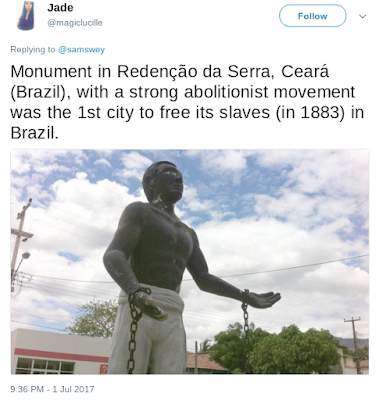This Twitter thread is too powerful to risk getting lost.
I'm capturing it here at my blog for safekeeping...
 |
It symbolizes breaking chains. A representation of Bussa who led a revolt against slavery in 1816. Slavery was abolished there soon after. It's displayed prominently. I saw it three times the first day I was there. And I realized I've never seen anything like it in America. In my entire life I've never seen any monument that symbolized the power of black liberation in the way this statue does. By design.
|
He stands in Buddhoe Park. There's an identical statue in Emancipation Garden on St Thomas. Emancipation Day is coming soon: July 3 (1848). At the time, these were the Danish West Indies. Most historic records, particularly re slavery, held in Copenhagen. Big hurdle for research. Oh, and in *Emancipation Garden* the main focal point isn't Buddhoe but a statue of King Christian of Denmark. Which...WTF.
The full tale of how USVI literally don't own their own story is fascinating + maddening, and told in this book:
At this point the thread continues to receive additional replies.
Following are additional screen shot of some of the images.
This is a poignant reminder of this year's Independence Day weekend, which brings yet another controversy over the removal of Confederate monuments, paranoid fears about immigrants and an endless stream of inflammatory twitter messages from the president stirring up controversies in the face of a nation-wide need for reconciliation.










No comments:
Post a Comment